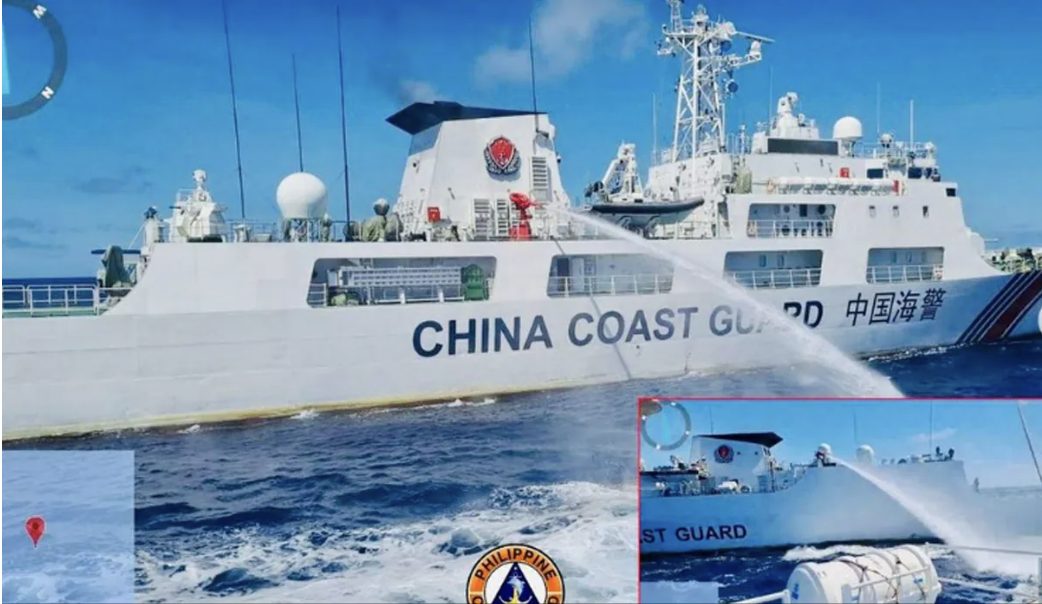The simmering tensions between China and the Philippines have once again brought the South China Sea into the global spotlight. The recent dispute centers around a grounded warship at Ren’ai Reef, a contested maritime territory. Beijing’s call for the immediate removal of the warship and the Philippines’ alleged attempts to reinforce its position on the reef have raised concerns about regional stability and international maritime norms. This article delves into the escalating situation, examining the conflicting claims, diplomatic maneuverings, and broader implications for international relations in the hotly contested waters of the South China Sea.
Table of Contents
Diplomatic Spat Over Grounded Warship
In a troubling development, a simmering diplomatic dispute between China and the Philippines has escalated, centering around a grounded warship at Ren’ai Reef. The incident has reignited long-standing territorial tensions in the South China Sea, with both countries staking their claims and asserting their rights over the contested waters.

Beijing’s Claims and Call for Restoration
China, through its Foreign Ministry and state-backed media outlet Global Times, has vociferously asserted Ren’ai Reef as an integral part of its Nansha Islands, commonly known as the Spratly Islands. Citing historical and geographical evidence, Beijing has called for the restoration of the reef’s “original status,” implying a strong stance against any perceived encroachment on its sovereignty.
Philippines’ Broken Promises and Strategic Maneuvers
The situation has been further complicated by the Philippines’ actions surrounding the grounded warship. Despite making assurances to remove the ship, it has not only failed to do so but has reportedly engaged in significant repair and reinforcement efforts. This strategic maneuvering has raised concerns in China that the Philippines is attempting to solidify its presence on the reef, marking a bold move in the ongoing territorial chess game.
Violation of International Law and Diplomatic Agreements
China has condemned the Philippines’ actions as a flagrant violation of international law and agreements, particularly the Declaration on the Conduct of Parties in the South China Sea (DOC), which China and ASEAN members signed. This declaration emphasizes the peaceful resolution of disputes and the avoidance of provocative actions, making the Philippines’ recent activities a contentious point of contention.
Escalation of Regional Tensions
As analysts have warned, this localized incident has the potential to have ripple effects throughout the region. The United States, a key player in the South China Sea dynamics, and its allies may view this as an opportunity to ramp up joint patrols and military presence in the area, thereby heightening the stakes and exacerbating an already tense geopolitical environment.
Dangerous Encounters at Sea and Implications
The confrontation between the Chinese Coast Guard and a smaller Philippine boat near Ren’ai Reef highlights the inherent risks in the South China Sea, where proximity and competing interests can lead to dangerous encounters. Such incidents can easily spiral out of control, prompting a reassessment of regional security and the role of international actors in maintaining order and adherence to established norms.
Philippines’ Condemnation and US Support
The Philippine Coast Guard’s swift condemnation of China’s actions underscores the gravity of the situation. This public denouncement on social media platforms highlights the Philippines’ determination to stand up to what it perceives as aggressive and unauthorized actions. Moreover, the United States prompt reiteration of its commitment to its mutual defense treaty with the Philippines sends a clear signal that any infringement on its ally’s sovereignty will not be taken lightly.
Implications for International Relations and Geopolitics
The Ren’ai Reef dispute serves as a microcosm of broader global trends, including the increasing assertiveness of rising powers, territorial disputes, and the complex interplay of alliances and strategic interests. The incident amplifies the ongoing struggle for influence and control in the South China Sea, pitting regional actors against one another while drawing in global superpowers.
Navigating Uncharted Waters: The Way Forward
Amidst the escalating tensions, diplomatic solutions must take center stage. The incident underscores the urgent need for open channels of communication, conflict resolution mechanisms, and respect for established international norms. Multilateral efforts involving regional stakeholders and international organizations may hold the key to de-escalation and long-term stability in the South China Sea.
Lessons from History and Hopes for Peace
History has shown that maritime disputes have the potential to spiral into larger conflicts with far-reaching consequences. As the world watches the situation at Ren’ai Reef unfold, there is a collective hope that lessons from the past will guide decision-makers toward peaceful dialogue and negotiation, rather than further confrontation.
Conclusion: A Test of Diplomacy and Global Leadership
The standoff at Ren’ai Reef underscores the fragility of maritime geopolitics and the intricacies of managing territorial disputes. The actions of the Philippines and China have reignited debates about sovereignty, international law, and regional stability. As the global community holds its breath, the choices made by these two nations and their allies will shape the trajectory of not only their bilateral relationship but also the broader geopolitical landscape. In an era where diplomacy and peaceful coexistence are paramount, the Ren’ai Reef incident serves as a litmus test for the resolve of nations to work together toward a more stable and harmonious future.












